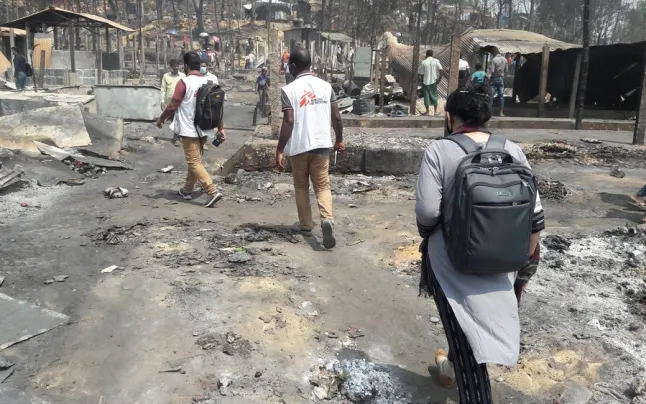The origin of the fire, which has forced the evacuation of 13,000 people living in the world's largest refugee camp, is unknown. Brussels has agreed to finance the immediate transfer of 400 minors to the continent.
Over 13,000 refugees living in the world's largest refugee camp, Mória, on the Greek island of Lesbos, are suffering from new uncertainty as of today. Specifically, the uncertainty of not knowing where they will live and sleep after a fire destroyed the refugee camp on Wednesday morning.
Several NGOs and activists have been denouncing for years the unhealthy conditions in which refugees lived in the camp, without Europe providing a solution—a situation that has worsened during the coronavirus pandemic. One such case is Stop Mare Mortum, who in an interview with their spokesperson, Sonia Ros, told us about the critical situation in the refugee camp.
The Mória camp has also suffered several attacks over the years. The origin of the fire in the area is still unknown. Greek authorities haven’t reported any injuries or fatalities. This uncertainty has led to talk of several unconfirmed possibilities, from the fire being started by one of the camp’s residents who have protested against the confinement measures to curb the spread of the virus, to it being started by a far-right group.
In recent weeks, an outbreak of coronavirus with almost a hundred infections has been detected, caused by the impossibility of maintaining safety distances and other health measures in a space designed to accommodate 3,000 people but with more than 13,000 inhabitants. As noted by Doctors Without Borders, who are working on the ground, the Greek government imposed a massive and potentially harmful quarantine after the first confirmed cases of Covid-19.
"We saw the fire spread across Mória and rage all night long. The whole place was engulfed in flames, we saw an exodus of people from a burning hell with no direction. Children scared and parents in shock. We are working now to address their needs”, explains Marco Sandrone, head of Doctors Without Borders in the area.
Twenty-five fire brigades have worked to put out the fire and to evacuate refugees, at midnight, to the road connecting the camp with Mytilene, the capital and main city of Lesbos. Most of the refugees lived in olive groves, where they had set up thousands of camping tents around a former detention centre.
First measures from Brussels
According to Ylva Johansson, the European Commissioner for Home Affairs, Brussels has agreed to finance the immediate transfer of the 400 unaccompanied minors in the Mória Refugee Camp to mainland Greece.
The European Commission is in contact with the Greek authorities to deal with the situation of the fire and the future of the Mória Refugee Camp, and argues that right now the most important thing is the "safety and shelter" of all the people in the camp.
The demands of the organizations
"The saddest thing, and what makes me most angry, is that it’s something that we see coming"m says Maria Creixell, from Caravana Obrim Fronteres and Coordinadora Obrim Fronteres, a thought shared by all the organizations whom work to defend the rights of refugees
Organizations working in Moria, such as Doctors Without Borders, have already warned of the unhealthy situation on the refugee camp. Sonia Ros, spokeswoman for Stop Mare Mortum, reiterates that organizations have been denouncing the conditions in Mória for years. "The fire, far from being an accident, is the result of a premeditated plan by all the governments responsible for these people to live in conditions”, he said.
The great demand from organizations is the urgent relocation of refugees. "We have been asking for it since 2015, when Spain and the other member states were obliged, by an agreement of the European Commission, to relocate these people," says Ros, who recalls that Stop Mare Mortum brought Mariano Rajoy's government to the Supreme Court for non-compliance with refugee quotas. Although the entity won, since then there has been a breach of the sentence by the Spanish government.
"According to the sentence, the number of people that Spain had to relocate is 119,000 people, ten times the number of people who were in these conditions", said the spokeswoman of Stop Mare Mortum. Creixell agrees on the demand for relocation and addresses responsibilities to Europe, and the governments of European countries.








Add new comment